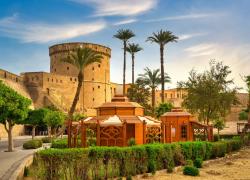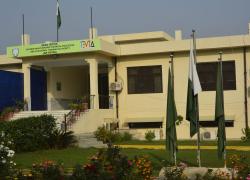University of Peshawar, Pakistan
The University of Peshawar (UoP), located in the capital city of Khyber Pakhtunkhwa province in Pakistan, is a prominent educational institution with a storied history and a significant impact on the region's academic and cultural landscape. Established in 1950, the university is one of the oldest and most respected institutions of higher learning in Pakistan. It has a diverse range of faculties and departments that cater to a wide array of academic disciplines.
Historical Background
The University of Peshawar was founded by Mr. Liaquat Ali Khan, the first Prime Minister of Pakistan, in October 1950. The establishment of the university was part of the government's efforts to promote higher education in the newly independent country. It was set up on the campus of Islamia College Peshawar, a prestigious institution in its own right, which had been a center of academic excellence since its founding in 1913.
Campus and Facilities
The University of Peshawar boasts a sprawling campus that covers an area of approximately 1,045 acres. The campus is a blend of historical buildings and modern infrastructure, providing a conducive environment for learning and research. The lush green surroundings and well-maintained gardens add to the aesthetic appeal of the campus.
The university is home to a variety of facilities, including well-equipped laboratories, libraries, lecture halls, and sports complexes. The Central Library, also known as the University Library, is one of the largest in the region and contains a vast collection of books, journals, and digital resources. The library serves as a vital resource for students and researchers alike.
Academic Structure
The University of Peshawar offers a comprehensive range of academic programs through its numerous faculties and departments. These include:
1. Faculty of Arts and Humanities: This faculty includes departments such as English, Urdu, History, and Philosophy. It focuses on the study of literature, languages, history, and critical thinking.
2. Faculty of Social Sciences: Comprising departments like International Relations, Political Science, and Sociology, this faculty addresses the complexities of social behavior, governance, and global affairs.
3. Faculty of Islamic and Oriental Studies: This faculty focuses on Islamic studies, Arabic, and Persian languages, contributing to the understanding of religious and cultural heritage.
4. Faculty of Management and Information Sciences: Departments under this faculty include Business Administration, Public Administration, and Library and Information Sciences. It aims to produce professionals equipped with management and information technology skills.
5. Faculty of Life and Environmental Sciences: This faculty covers departments such as Botany, Zoology, Environmental Sciences, and Geology. It emphasizes the study of living organisms and their interactions with the environment.
6. Faculty of Numerical and Physical Sciences: This faculty includes departments like Mathematics, Physics, and Computer Science. It focuses on the principles of science and technology.
7. Faculty of Education: This faculty offers programs in various aspects of education, preparing teachers and educational administrators.
8. Faculty of Law: The Law College offers undergraduate and postgraduate degrees in law, training future lawyers and legal scholars.
Academic Programs
The University of Peshawar offers a wide range of academic programs at the undergraduate, graduate, and postgraduate levels. These programs span various disciplines, including natural sciences, social sciences, humanities, engineering, business administration, law, and medical sciences. The university is committed to providing a holistic education that combines theoretical knowledge with practical skills, preparing students for successful careers in their chosen fields.
At the undergraduate level, UoP offers bachelor's degrees in numerous disciplines. These programs are designed to provide students with a strong foundation in their respective fields of study, enabling them to develop critical thinking and problem-solving abilities. The undergraduate curriculum is regularly updated to align with international standards and industry requirements.
For graduate and postgraduate students, the university offers master's and doctoral programs that emphasize advanced research and specialized knowledge. These programs are aimed at producing scholars and professionals who can contribute to the advancement of their fields through original research and innovative ideas. The university encourages interdisciplinary research and collaboration, promoting a culture of academic excellence.
Research and Development
The University of Peshawar places a strong emphasis on research and development. It has numerous research centers and institutes that focus on various fields of study. Some of the prominent research centers include the National Centre of Excellence in Physical Chemistry, the Institute of Chemical Sciences, and the Institute of Archaeology and Anthropology.
These research centers collaborate with national and international organizations to conduct cutting-edge research and contribute to the advancement of knowledge. The university also publishes several research journals, which provide a platform for scholars to disseminate their findings.
Community and Cultural Impact
The University of Peshawar is not just an academic institution; it is a significant cultural and social hub. The university organizes various cultural events, seminars, and conferences that promote intellectual and cultural exchange. The Annual Literary and Cultural Week, for example, is a much-anticipated event that showcases the talents of students in various arts and cultural activities.
The university also plays a crucial role in community service. It engages with local communities through various outreach programs, addressing social issues and contributing to the development of the region. The university's commitment to social responsibility is evident in its efforts to promote education and awareness on important issues such as health, environment, and social justice.
Challenges and Future Prospects
Like many educational institutions in developing countries, the University of Peshawar faces several challenges. These include financial constraints, the need for modernization of infrastructure, and the demand for more advanced research facilities. Additionally, political instability and security concerns in the region have at times impacted the university's operations.
However, the university continues to strive towards excellence. There is a concerted effort to enhance the quality of education and research. Initiatives are underway to upgrade facilities, improve academic programs, and foster international collaborations. The university's leadership is focused on creating an environment that is conducive to learning and innovation.
Conclusion
The University of Peshawar stands as a beacon of higher education in Pakistan. Its rich history, diverse academic offerings, and commitment to research and community service make it a pivotal institution in the region. Despite the challenges, the university's dedication to excellence and development promises a bright future for its students and the broader community.
The University of Peshawar continues to evolve, adapting to the changing educational landscape and the needs of society. With its strong foundation and forward-looking vision, it remains a vital contributor to the intellectual and cultural growth of Pakistan.










